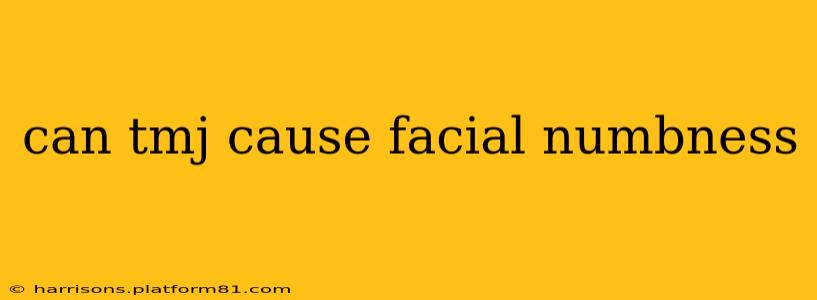Can TMJ Cause Facial Numbness? Understanding the Link Between Temporomandibular Joint Disorder and Facial Sensations
Temporomandibular joint disorder (TMJ) is a common condition affecting the jaw joint and surrounding muscles. While jaw pain and clicking are the most well-known symptoms, many sufferers experience a wider range of symptoms, including facial numbness. This article explores the potential connection between TMJ and facial numbness, answering common questions and providing valuable insights.
What is TMJ?
TMJ refers to problems with the temporomandibular joint, which connects your jawbone to your skull. This joint allows you to open and close your mouth, chew, and speak. When this joint becomes misaligned, inflamed, or damaged, it can lead to a variety of symptoms, collectively known as TMJ disorders. These disorders can stem from various factors, including trauma, arthritis, genetics, and stress-related clenching or grinding of the teeth (bruxism).
Can TMJ Cause Facial Numbness?
Yes, facial numbness can be a symptom of TMJ, though it's not always a direct or primary symptom. The connection is often indirect and involves the compression or irritation of nerves surrounding the jaw joint. The trigeminal nerve, a major cranial nerve responsible for sensation in the face, is located near the TMJ. When the joint is inflamed or misaligned, it can put pressure on this nerve, leading to numbness, tingling, or even pain in areas of the face served by that nerve.
How Does TMJ Lead to Facial Numbness?
The mechanisms by which TMJ can cause facial numbness are complex and not fully understood in every case. However, some key factors include:
- Nerve Compression: Inflammation and swelling associated with TMJ can directly compress the trigeminal nerve or other branches of cranial nerves, disrupting the transmission of sensory signals.
- Muscle Spasm: Tight and spasming muscles surrounding the jaw can also indirectly compress nerves, leading to numbness or altered sensation.
- Joint Displacement: A misaligned jaw joint can put pressure on nerves, impacting their function and potentially causing numbness.
What Areas of the Face Might Experience Numbness Due to TMJ?
The area of facial numbness will depend on which branch of the trigeminal nerve is affected. Numbness can potentially occur in:
- Lower face: This is a common area affected due to the proximity of the TMJ.
- Chin: Numbness or tingling in the chin is a particularly noteworthy symptom that should be evaluated.
- Lips: Numbness in the lips can also be associated with TMJ.
Other Symptoms Associated with TMJ
It's important to remember that facial numbness often accompanies other symptoms of TMJ, such as:
- Jaw pain: This is the most common symptom.
- Clicking or popping in the jaw: A characteristic sound when opening or closing the mouth.
- Limited jaw movement: Difficulty opening your mouth wide.
- Headaches: Often tension headaches.
- Earaches: Pain in or around the ear.
How is TMJ-Related Facial Numbness Diagnosed?
Diagnosing TMJ-related facial numbness requires a thorough evaluation by a healthcare professional, often a dentist specializing in TMJ disorders or an oral surgeon. They will likely perform a physical examination of your jaw joint, assess your range of motion, and review your medical history. Imaging studies like X-rays or MRI scans may be necessary to rule out other causes of facial numbness and confirm the diagnosis of TMJ.
Treatment Options for TMJ-Related Facial Numbness
Treatment for TMJ-related facial numbness focuses on managing the underlying TMJ disorder. Options may include:
- Pain relievers: Over-the-counter or prescription medications to reduce pain and inflammation.
- Physical therapy: Exercises to improve jaw mobility and strengthen surrounding muscles.
- Splints or mouthguards: To reduce teeth grinding and protect the jaw joint.
- Lifestyle changes: Stress management techniques to reduce jaw clenching.
- Injections: Corticosteroid injections can reduce inflammation in the joint.
- Surgery: In severe cases, surgery may be considered.
Disclaimer: This information is for general knowledge and does not constitute medical advice. Always consult a healthcare professional for any medical concerns or before making any decisions related to your health or treatment. If you experience facial numbness, it's crucial to seek medical attention to determine the underlying cause and receive appropriate treatment.
